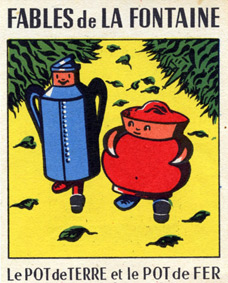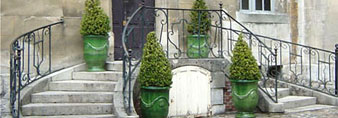Fables, Jean de La
Fontaine
Book V, fables 1, 2, 3, 4 |
| |
THE WOODMAN AND MERCURY (V, 1)
To M. L. C. D. B.
(probably M. Le Chevalier de Bouillon)
My work has made your taste its constant guide,
To gain your suffrage have I ever tried.
You wish to shun an over-laboured care,
And empty pomp that melts away in air.
This is my aim—such efforts please but few,
Authors spoil all who try to write too well.
Not that we should some certain traits expel ;
You don't dislike them—and I like them too.
The object Ǽsop had in view
I fail as little as I can to reach.
And if my verses neither please nor teach,
’Tis not my fault--that's something to the good.
In the first rank of strength I never stood,
No arm of Hercules have I,
Against the monter vice ;
To hold it up to ridicule I try :
This is my talent—and let that suffice.
Sometimes I paint the scene,
To show mad vanity with envy joined,
Life turning on two pivots then is seen ;
Such is the little animal so mean,
Who swelled to rival with the oxen kind.
Anon a double portrait I expose ;
To virtue vice, folly to sense it shows,
The ravening wolves to lambs, to ants the flies,
Making of all these fictions joined to facts,
A play that branches to a hundred acts,
Of which the scene in boundless nature lies.
Here gods, men, animals, all take their stand,
Even Jove himself. But speak we of the god,
Who to the fair bears his imperial nod,—
Though not the point that we have here in hand.
A woodman lost his means of gain,
His hatchet, which he sought in vain ;
’Twas grief to hear him sob and cry ;
He had no tools to sell nor means to buy
His hatchet kept his hope alive,
With that went all his means to thrive.
His cheeks were bathed with tears : he sighed :
“ My axe ! O my poor axe ! ” he cried ;
“ Restore it, Jupiter, to me,
I’ll own a second life from thee ! ”
Olympus heard him as he prayed,
And Mercury came down, and said :
“ The hatchet's safe, and I can show it,
But are you sure that you will know it ?
An axe I found near on the road.”
With that an axe of gold he showed.
This to be his the man denied.
A silver next his virtue tried,
“ But that's not mine,” the man replied.
Then one of wood the god displayed,
“ I'm happy now,” the woodman said ;
“ This is the one for which I prayed.”
The god rejoined ; “ Take all the three,
To recompense your honesty.”
He took them all, and thanked the god.
The story soon got spread abroad ;
The bumpkins lost their tools, and roared
To get them thus so well restored.
The king of gods which wight to hear scarce knows,
Again sends Mercury to heal their woes ;
To each an axe of gold he shows,
And each had thought himself a pretty fool,
Not to have cried at once ; “ Ay, that’s my tool ! ”
Bot Mercury gave not that axe, instead
Laid it with vengeance on each rascal’s head.
Be happy with your lot, and tell no lies,
Nor think to cheat the Ruler of the skies.
|
THE IRON POT AND CLAY POT (V, 2)
An iron pot proposed one day
To travel with a pot of clay :
The latter made his best excuse,
And thought it prudent to refuse :
“ Better,” he said, “ to stay at home,
Than idly thus abroad to roam.
For me the smallest thing that hits,
Will crack or break me all to bits,
Nor scrap of me find home again.
But you,” he cried, “ let nought detain ;
Your texture shows such strength of skin,
I see not aught to keep you in.”
“ I’ll screen you,” cried the solid pot ;
“ If aught of danger be your lot ;
I’ll get between the two, ye know,
And from your body ward the blow."
This offer made his fears subside,
He joined the iron pot with pride,
And both went hobbling on together,
Laughing at accidents and weather.
But shortly they too near each other roll,
As they went jogging cheek by jowl ;
And all along the way
Suffered that pot of clay.
Hardly, in fine, a hundred paves gone,
When by his comrade he was overthrown,
And smashed to bits without the time to groan.
Then let us with our equals only stay,
Or think with trembling on that pot of clay. |
|
THE LITTLE FISH AND FISHER (V, 3)
The smallest fish will grow too great,
If God allows him such a fate ;
But when he’s caught, to let him go
I think myself would folly show,
For he don’t bite again so soon, we know.
A fisher on the river’s bank, we hear,
Hooked out a carpling of the smallest fry :
“ Still that makes one,” the man did cry,
“ And the beginning of my merry cheer :
Come, let us bag thee, little rogue. ”
The carpling pleaded in his brogue :
“ Alas ! what can you make of me ?
Not half a mouthful shall I be !
Let me the size of carp attain,
And then you’ll hook me up again ;
Some rich contractor you'll entice
To buy me at a handsome price,
Whereas in my poor wretched state,
A hundred scarce will fill a plate :
And such a plate ! not worthy to be tried.”
“ Well, be it so,” the fisherman replied ;
“ Friend fish, you finely preach away ;
But you must go to pot, whate'er you say,
For certainly to-night you shall be fried.”
One fish in hand's worth two we have not got ;
The one is certain, and the other's not. |
|
THE HARE AND HIS EARS (V, 4)
The lion had received some blows
From a horned beast, at which his wrath arose ;
And to prevent the like again,
Banished from every place in his domain.
All beasts with horns upon their brows.
Goats, rams, and bulls, and eke their cows,
Does with their bucks, obliged to change their clime,
And to decamp without more loss of time.
A hare perceived the shadow of his ears,
Which soon caused him a thousand fears,
Lest some inquisitor should them construe
Horns by their length, horns from all points of view.
“ Adieu, friend Cricket, ” cried he, as he passed,
“ I’m off ; my ears would grow to horns at last,
And though no longer than the ostrich size,
I should be frightened.”—“ Horns” the cricket cries,
“ You think me fool, or sure you rave ;
You wear the ears that Nature gave.”
“ I tell you, they would make them pass for horns,
Ay, marry, and for horns of unicorns :
I might oppose my reason to their might,
They'd only house me for a Bedlamite.” |
|

RIDDLE
They are far from the village ...
By looking well, you will still perceive tne church |
|
|



